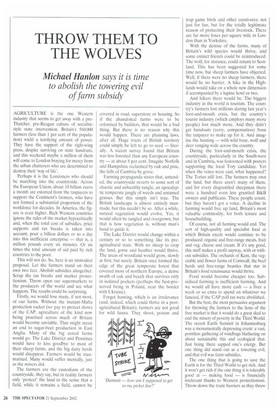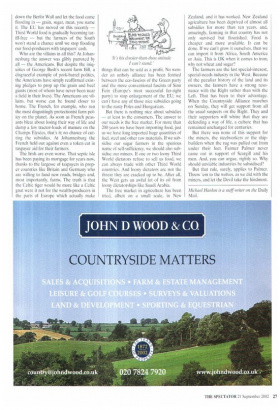THROW THEM TO THE WOLVES
Michael Hanlon says it is time
to abolish the towering evil of farm subsidy
AGRICULTURE is the one Western industry that seems to get away with a preThatcher, pre-Reagan culture of socialiststyle state intervention. Britain's 560.000 farmers (less than 1 per cent of the population) wield a terrifying amount of power. They have the support of the right-wing press, despite surviving on state handouts, and this weekend maybe a million of them will come to London braying for mercy from the urban chatterers who are determined to destroy their 'way of life'.
Perhaps it is the Londoners who should be marching into the countryside. Across the European Union, about 10 billion euros a month are extorted from the taxpayers to support the Continent's farmers, who have not formed a substantial proportion of the workforce for decades. In America, the figure is even higher. Rich Western countries ignore the rules of the market hypocritically and, when the total cost of subsidies, price supports and tax breaks is taken into account, pour a billion dollars or so a day into this inefficient enterprise — that is, a million pounds every six minutes. Or six times the total amount of aid paid by rich countries to the poor.
This will not do. So, here is an immodest proposal. Let the farmers stand on their own two feet. Abolish subsidies altogether. Scrap the tax breaks and market protectionism. Throw open our supermarkets to the producers of the world and see what happens. The results could be surprising.
Firstly, we would lose many, if not most, of our farms. Without the mutant-Mafia protection racket (we pay to protect them) of the CAP, agriculture of the kind now being practised across much of Britain would become unviable. That might mean an end to sugar-beet production in East Anglia. Many of the big cereal farms would go. The Lake District and Pennines would have to kiss goodbye to most of their sheep farms, and the big dairy herds would disappear. Farmers would be traumatised. Many would suffer mentally, just as the miners did.
The farmers are the custodians of the countryside, they say, but in reality farmers only 'protect' the land in the sense that a field, while it remains a field, cannot be covered in road, superstore or housing. So if the abandoned farms were to be colonised by builders, that would be a bad thing. But there is no reason why this would happen. There are planning laws, after all. Huge tracts of British territory could simply be left to go to seed — literally. A recent survey found that Britain was less forested than any European country — at about 8 per cent. Imagine Norfolk and Hampshire reclaimed by oak and pine, the fells of Cumbria by gorse.
Farming propaganda states that, untended, the countryside reverts to some sort of chaotic and unhealthy tangle, an apocalyptic temperate jungle of weeds and untamed grasses. But this simply isn't true. The British landscape is almost entirely manmade, but this needn't be so. After a while, natural vegetation would evolve. Yes, it would often be tangled and overgrown, but that is how vegetation is, without man's hand to guide it.
The Lake District would change within a century or so to something like its preagricultural state. With no sheep to crop the land, gorse and heather would thrive. The areas of woodland would grow, slowly at first, but surely. Britain once formed the edge of the great temperate forest that covered most of northern Europe, a dense swath of oak and beech that survives only in isolated pockets (perhaps the best-preserved being in Poland, near the border with Ukraine).
Forget hunting, which is an irrelevance (and, indeed, which could thrive in a postagricultural Britain); farmers are not good for wild fauna. They shoot, poison and trap game birds and other carnivores; not just for fun, but for the totally legitimate reason of protecting their livestock. There are far more foxes per square mile in London than in Yorkshire.
With the demise of the farms, many of Britain's wild species would thrive, and some extinct friends could be reintroduced. The wolf, for instance, could return to Scotland. This has been suggested for some time now, but sheep farmers have objected. Well, if there were no sheep farmers, there would be no barrier. A hike in the Highlands would take on a whole new dimension if accompanied by a lupine howl or two.
And hikers there would be. The biggest industry in the world is tourism. The country's farmers lost millions during last year's foot-and-mouth crisis, but the country's tourist industry (which employs many more people) lost much more. And they didn't get handouts (sorry, compensation) from the taxpayer to make up for it. And imagine the hunting — with wild boar, wolf and deer ranging wide across the country.
During the foot-and-mouth crisis, the countryside, particularly in the South-west and in Cumbria, was festooned with posters supporting the local Tory candidate. Yet when the votes were cast, what happened? The Tories still lost. The farmers may own the land, but there aren't many of them, and for every disgruntled sheepman there were a hundred even less gruntled B&B owners and publicans. These people count, but they haven't got a voice. A decline in farming would free up land, Britain's most valuable commodity, for both leisure and housebuilding.
Of course, not all farming would end. The sort of high-quality and specialist food at which Britain excels would continue to be produced: organic and free-range meats, fruit and veg, cheese and cream. If it's any good, this stuff makes a profit anyway, with or without subsidies. The orchards of Kent, the vegetable and flower farms of Cornwall, the beef herds and free-range beasties that star in Britain's food renaissance would thrive.
Food would become cheaper too. Subsidised farming is inefficient farming. And we would all have more cash — a fiver a week or so extra to spend on whatever we fancied, if the CAP poll tax were abolished.
But the best, the most persuasive argument for throwing the farmers to the lions of the free market is that it would do a great deal to end the misery of poverty in the Third World. The recent Earth Summit in Johannesburg was a monumentally depressing event: a vast, pointless gathering of windbags blathering on about sustainable this and ecological that. Just being there sapped one's energy. But one thing did stand out as a towering evil, and that evil was farm subsidies.
The one thing that is going to save the Earth is for the Third World to get rich. And it won't get rich if the one thing it is tolerably good at — making food — is financially irrelevant thanks to Western protectionism. Throw down the trade barriers as they threw down the Berlin Wall and let the food come flooding in — grain, sugar, meat, you name it. The EU has moved on this recently — Third World food is gradually becoming tariff-free — but the farmers of the South won't stand a chance until we stop flooding our food-producers with taxpayers' cash.
Who are the villains in all this? At Johannesburg the answer was glibly parroted by all — the Americans. But despite the iniquities of George Bush's recent farm Bill, a disgraceful example of pork-barrel politics, the Americans have simply reaffirmed existing pledges to prop up the grain and beef giants (most of whom have never been near a field in their lives). The Americans are villains, but worse can be found closer to home. The French, for example, who run the most disgustingly protectionist farm policy on the planet. As soon as French peasants bleat about losing their way of life and dump a few tractor-loads of manure on the Champs Elysees, that's it; no chance of cutting the subsidies. At Johannesburg the French held out against even a token cut in taxpayer aid for their farmers.
The Irish are even worse. That septic isle has been paying its mortgage for years now, thanks to the largesse of taxpayers in proper countries like Britain and Germany who are willing to fund new roads, bridges and, most importantly, farms. The truth is that the Celtic tiger would be more like a Celtic gnat were it not for the wealth-producers in the parts of Europe which actually make things that can be sold as a profit. No wonder an unholy alliance has been formed between the eco-fascists of the Green party and the more conventional fascists of Sinn Fein (Europe's most successful far-right party) to stop enlargement of the EU; we can't have any of those nice subsidies going to the nasty Poles and Hungarians.
But there is nothing nice about subsidies — at least to the consumers. The answer to our needs is the free market. For more than 200 years we have been importing food, just as we have long imported huge quantities of fuel, steel and other raw materials. If we subsidise our sugar farmers in the spurious name of self-sufficiency, we should also subsidise our miners. If one or two loony Third World dictators refuse to sell us food, we can always trade with other Third World countries. And loony dictators are not the threat they are cracked up to be. After all, the West gets an awful lot of its oil from loony dictatorships like Saudi Arabia.
The free market in agriculture has been tried, albeit on a small scale, in New Zealand, and it has worked. New Zealand agriculture has been deprived of almost all subsidies for more than ten years, and, amazingly, farming in that country has not only survived but flourished. Food is cheaper and more available. It can be done. If we can't grow it ourselves, then we can import it from Africa, South America or Asia. This is OK when it comes to iron; why not wheat and sugar'?
The farmers are the last special-interest, special-needs industry in the West. Because of the peculiar history of the land and its owners, the farmers have a strong resonance with the Right rather than with the Left. That has been to their advantage. When the Countryside Alliance marches on Sunday, they will get support from all the usual suspects on the Right. They and their supporters will whine that they are defending a way of life, a culture that has remained unchanged for centuries.
But there was none of this support for the miners, the steelworkers or the shipbuilders when the rug was pulled out from under their feet. Farmer Palmer never came out in support of Scargill and his men. And, you can argue, rightly so. Why should unviable industries be subsidised?
But that rule, surely, applies to Palmer. Throw 'em to the wolves, as we did with the miners, and let the Devil take the hindmost.
Michael Hanlon is a staff writer on the Daily Mail.











































































 Previous page
Previous page